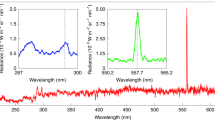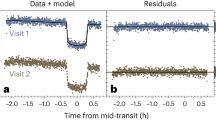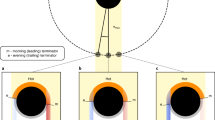Abstract
IN a previous communication1, it was pointed out that strong absorption by atmospheric constituents obscures large parts of the infra-red spectrum from ground-level observation. However, by working at high altitudes and by using a high-resolution spectrometer, it is possible to observe additional features due to absorption in the solar atmosphere. Among these are two absorption lines due to the electronic transitions in solar hydrogen 3–4 and 4–8, which occur in the great water-vapour band at 1.9µ.
This is a preview of subscription content, access via your institution
Access options
Subscribe to this journal
Receive 51 print issues and online access
$199.00 per year
only $3.90 per issue
Buy this article
- Purchase on Springer Link
- Instant access to full article PDF
Prices may be subject to local taxes which are calculated during checkout
Similar content being viewed by others
References
Houghton, J. T., Moss, T. S., Seeley, J. S., and Hawkins, T. D. F., Nature, 180, 1187 (1957).
Houghton, J. T., and Seeley, J. S., Quart. J. Roy. Met. Soc., 86, 358 (1960).
Author information
Authors and Affiliations
Rights and permissions
About this article
Cite this article
HUGHES, N., MOSS, T. Some Solar Lines in the Infra-Red Spectrum observed from a High-Flying Aircraft. Nature 189, 908–909 (1961). https://doi.org/10.1038/189908a0
Issue Date:
DOI: https://doi.org/10.1038/189908a0
Comments
By submitting a comment you agree to abide by our Terms and Community Guidelines. If you find something abusive or that does not comply with our terms or guidelines please flag it as inappropriate.



